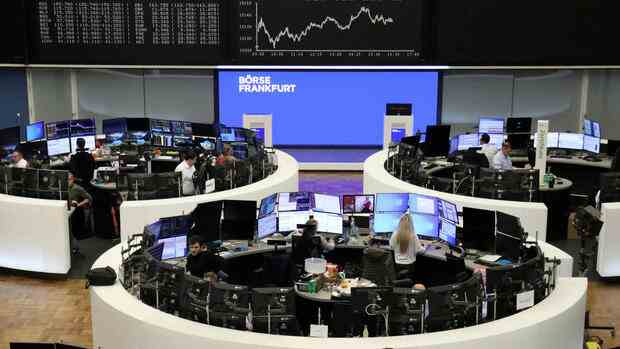Was that it? After a terrible year for stocks and bonds, the German share index (Dax) has gained around nine percent since the beginning of January alone, and in the last three months it was up around 20 percent. US stocks started slower but are also showing a positive trend. Even bitcoin and some tech stocks have recovered.
In fact, there are reasons for the new hope: Inflation is falling significantly in almost all countries. The central banks are expected to be able to at least take a somewhat more relaxed approach to tightening monetary policy. Fears of recession have not gone away, but have subsided significantly, also thanks to the warm weather in Europe. With a bit of luck, the world economy could have a reasonably good year economically, contrary to the sometimes gloomy forecasts.
But it would be too easy to transfer an optimistic view of the economy directly to the markets. Because this shows that after the central banks were investors’ friends for years, they are now more their enemies. And that should also characterize the new year.
confusion in Japan
The Bank of Japan is just a special case. Above all, it put the yen under pressure because its expectation management was anything but optimal. The expectation was that interest rates would soon rise in Japan, the last major industrialized country. But then, at the meeting on Wednesday, nothing happened. That led to confusion.
Top jobs of the day
Find the best jobs now and
be notified by email.
The problem is different for the other major central banks, above all the Fed in the USA and the European Central Bank (ECB). In times of low inflation, they were always able to save the stock markets with low interest rates or bond purchases when things got tight there, which ultimately led to very high valuations.
The central bank has not increased the key interest rate – contrary to expectations.
(Photo: Reuters)
Now, however, high exchange rates are poison for your monetary policy because, conversely, they mean favorable financing conditions and thus also fuel for inflation. Therefore, there is a high risk that the Fed and Co will intervene again and again if the optimism on the markets becomes too great.
This applies above all to the USA. Because although the big tech companies are laying off thousands of employees there, the labor market remains very tight overall, which makes it difficult to fight inflation.
The expectations of the markets are contradictory anyway. The stock exchanges are characterized by too much optimism. If fears of recession arise, they hope for an easing of monetary policy – and rise. When fears of a recession recede, they see that as a positive for corporate earnings – and they’re also increasing. In addition, the stock markets and the bond markets contradict each other.
Because bonds are showing a strong inversion, especially in the USA, which usually heralds a recession. Inversion means that the yields on long-term securities are lower than those on short-term securities. This shows that markets are expecting interest rates to fall, and that usually coincides with or is triggered by a recession.
Dangerous Contradictions
Such contradictions in market expectations have to be resolved at some point and are often accompanied by violent price fluctuations. One possibility is that there is too much optimism in the stock market and pessimism in the bond market. That would resolve the contradiction between these areas, but at least mitigate the contradictions in expectations within the stock market.
>>Read also: Dax starts long-awaited consolidation – local professionals are in a quandary
In this difficult situation, it is difficult to draw up scenarios for the current year. One could look like this: Inflation falls as expected, central bank interest rates initially continue to rise, but at a slower pace. The recession will remain mild and the central banks will soon at least very cautiously announce a reduction in interest rates from the high level. Markets get shaken up from time to time because with such divergent expectations, disappointments always crop up somewhere. All in all, 2023 may still be a good year for the stock markets.
Ultimately, such a good scenario would mean that after several years of crisis, 2023 will be the year in which the crisis will essentially be overcome. In retrospect, the economic damage would be even less than would be expected in view of a century-long plague and a Russian war of aggression against a neighboring European country.
However, there are two limitations. Even if the global economy, also supported by China’s opening up, gains some traction, higher national debt will remain as damage in addition to the reduced purchasing power due to the phase of high inflation. This is not necessarily a mistake: government debt also has the function of absorbing economic hardship and spreading it over a longer period of time. However, that does not change the need to pursue a very disciplined financial policy in the future.
But there is another point: because the stock market has already been doing quite well, expectations for the future should not be too high. Even if the net result is nothing more than zero from now on, it would still be a decent result – especially considering that this year is full of geopolitical risks with a view to the Ukraine war and China’s threats against Taiwan.
More: What the rise of the Marketmaker Citadel means
